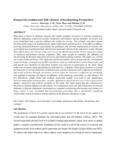| dc.description.abstract | Education is meant to develop capacity and enable members of society to become productive. African indigenous education systems inculcated self-reliance among members of society and every individual had a specific defined role within the society. The colonial education system introduced the aspects of unemployment, underemployment and job seekers. In an effort to address growing mismatch between expectations by graduates and societal employment provisions, the government has regularly formed commissions and made reforms in the education system. Despite these efforts there has been growing concerns on the effectiveness of the current education system to inculcate self-reliance among graduates. This study sought to establish the influence of decolonizing the Kenyan education system on self-reliance among students. The study was carried out in universities in Kenya. This study utilized the descriptive survey design and the correlational research design. A sample size of 384 respondents made up of 60 members of teaching faculty and 324 fourth year bachelor of education students was selected to participate in the study. Data collection was done using questionnaires and interview schedules. Descriptive statistics was used for measures of central tendencies including mean, standard deviation and coefficient of variation. Inferential statistics through correlation analysis using the Pearson‘s coefficient of correlation was applied to measure the degree of influence of decolonizing curriculum on self-reliance. To test hypothesis, simple linear and multiple regression models were used to test significance between independent and dependent variable. Qualitative data from interviews was organized into themes, categories and patterns pertinent to the study. The study found that the contemporary Kenyan curriculum influenced self-reliance to a moderate extent and that integration of selected elements of African indigenous curriculum was capable of improving the Kenyan curriculum to a large extent. It was concluded that decolonizing curriculum had a statistically significant relationship with self-reliance among students in the Kenyan education system | en_US |

